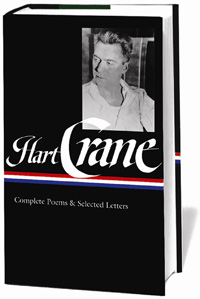
TOUGH LOVE: The accessible poets of Crane’s days are dust, but his hard lines endure.
|
Hart Crane roared through his short, tormented, and doomed life. Born in Ohio in 1899 and reared by feuding parents, he quit high school at 17 to be a poet in New York. His great talent was recognized early, and his work found publishers and patrons. But Crane could not escape his demons: his drunks were epic and obnoxious, testing all his friendships. Returning from Mexico in 1932, he drowned himself off the Isle of Pines near Cuba. It is a stunning irony that his father invented the Life Saver candy. The facts of his volatile life have prompted several biographies, the most recent of which appeared in 2002.
Crane was not a modernist, but his long poem The Bridge is a modern poem. His literary grandfathers were Walt Whitman and Herman Melville. He found more in common with Yvor Winters and Allen Tate than with his great contemporaries Pound, Stevens, and Williams. His poetry is celebrated for wild genius and knotty brilliance but in the next breath disparaged as flawed.
In this volume, well edited by Langdon Hammer (I am no expert but a fan of 47 years who still has his heavily marked copy of the paperback selected poems), there are 143 pages of poetry followed by a selection of Crane’s critical prose and more than 500 pages of his letters. No other significant 20th-century American poet’s work has this configuration. Crane’s short life is one explanation; a second is his tireless revising. Who cares how many pages a poet produces when he writes of Melville, “The dice of drowned men’s bones he saw bequeath/An embassy,” and begins the exquisite “Pastorale”:
No more violets
And the year
Broken into smoky panels.
Even in his drunken, downward-speeding last days, Crane wrote “And so it was I entered the broken world/To trace the visionary company of love . . . ” We would love to have more Crane, but that was not to be.
The first of his two published books, White Buildings, 29 pages in this volume, may be slender, but it is exceptional. If Crane did not arrive entirely coherent, his packed lines and high tone are original to him. Allen Tate’s plodding introduction, reprinted here, missed the point in emphasizing his obscurity. The accessible poets of Crane’s days are dust; his hard lines endure.
The Bridge occupied much of his writing life. He seemed to need a plan not to complete but to revise. The poem is dedicated “To Brooklyn Bridge,” at which he looked while living in Brooklyn Heights during some of the poem’s composition. The Bridge is a great New York poem, and one of its heirs is Frank O’Hara. Skyscrapers brought modernity to Manhattan, and Crane caught the moment: “Down Wall, from girder into street noon leaks/A rip-tooth of the sky’s acetylene.” The poem is said to have risked and failed. It is worth a hundred successes. “O harp and altar, of the fury fused . . . ”
Crane’s letters are to his life what the soul is to the body. He is here complete — exalted, cringing, at work, begging, apologizing, tearing apart while building, always true to his impossible self. At the end he wrote, “Am going back to Cleveland to help in the business crisis. Permanent address — Box 604, Chagrin Falls, Ohio.” Heartbreaking. He knew his fate when he wrote, “This fabulous shadow only the sea keeps.”
Hart Crane: Complete Poems & Selected Letters | Edited by Langdon Hammer | The Library of America | 863 pages | $40